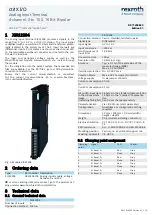
Access from the user program
KL1501, KL1512
38
Version: 3.1.0
Explanation:
• The terminal returns a value as a receipt in the status byte that differs only in bit 0.6 from the value of
the control byte.
• The input data word (byte 1 and byte 2) is of no importance after the write access. Any values still
displayed are invalid!
II. Read Register 31 (check the set code word)
Output Data
Byte 0: Control byte
Byte 1: DataOUT1, high byte
Byte 2: DataOUT1, low byte
0x9F (1001 1111
bin
)
0xXX
0xXX
Explanation:
• Bit 0.7 set means: Register communication switched on.
• Bit 0.6 not set means: reading the register.
• Bits 0.5 to 0.0 specify the register number 31 with 01 1111
bin
.
• The output data word (byte 1 and byte 2) has no meaning during read access.
Input Data (answer of the bus terminal)
Byte 0: Status byte
Byte 1: DataIN1, high byte
Byte 2: DataIN1, low byte
0x9F (1001 1111
bin
)
0x12
0x35
Explanation:
• The terminal returns the value of the control byte as a receipt in the status byte.
• The terminal returns the current value of the code word register in the input data word (byte 1 and byte
2).
III. Write to Register 32 (change contents of the feature register)
Output data
Byte 0: Control byte
Byte 1: DataIN1, high byte
Byte 2: DataIN1, low byte
0xE0 (1110 0000
bin
)
0x00
0x02
Explanation:
• Bit 0.7 set means: Register communication switched on.
• Bit 0.6 set means: writing to the register.
• Bits 0.5 to 0.0 indicate register number 32 with 10 0000
bin
.
• The output data word (byte 1 and byte 2) contains the new value for the feature register.
CAUTION
Observe the register description!
The value of 0x0002 given here is just an example!
The bits of the feature register change the properties of the terminal and have a different meaning, depend-
ing on the type of terminal. Refer to the description of the feature register of your terminal (chapter
Register
description
) regarding the meaning of the individual bits before changing the values.
Input data (response from the Bus Terminal)
Byte 0: Status byte
Byte 1: DataIN1, high byte
Byte 2: DataIN1, low byte
0xA0 (1010 0000
bin
)
0xXX
0xXX
Explanation:








































